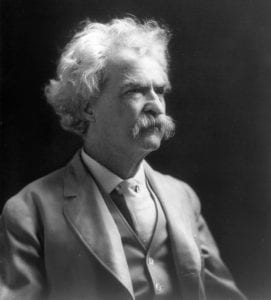By Sarah Hill
Created in 1936, the Mark Twain Journal is a nationally recognized journal which holds a staff of renowned Twainian scholars. Baylor’s Dr. Joe B. Fulton, professor of English, is one of the country’s most recognized Twainians, and has recently been awarded the title of “Legacy Scholar” by the Mark Twain Journal. He also has become a member of the journal’s editorial board.
“I really appreciate it because it is Twain scholars themselves who are giving me this award,” Fulton said. “They’re people whose work I really respect and I’m touched that they would honor me in this way.”
Fulton has published four books on Twain in addition to his most recent work, “Mark Twain Under Fire: Reception and Reputation, Criticism and Controversy, 1851-2018.” In addition to receiving his award and being highlighted in the Mark Twain Journal, three of Fulton’s longtime colleagues and fellow Twain scholars wrote highly complementary profiles in his honor.
Fulton values the sense of community that exists among Twain scholars, and said they are a convivial group of academics who get along well.
Fulton’s appreciation for Twain and continued study of his works began after graduating from Purdue with a B.A. in Russian language and literature.
“As I began to study Russian literature I realized that the foremost practitioner of this in the English language is Mark Twain,” Fulton said. However, Twain entered Fulton’s life much earlier and a connection was forged between the two of them that remains strong to this day.
“I figured a farm boy who grows up in the Midwest on the Wabash River has all the education he needs to study American dialect writing,” Fulton said.
 Fulton’s sister, Susan, gave him a copy of Huckleberry Finn on his eighth birthday, and his other sister, Jane, read Tom Sawyer to Fulton and his brother. Looking back, Fulton fondly recalls those times.
Fulton’s sister, Susan, gave him a copy of Huckleberry Finn on his eighth birthday, and his other sister, Jane, read Tom Sawyer to Fulton and his brother. Looking back, Fulton fondly recalls those times.
“To this day, when I ventriloquate Twain’s words off the page of Tom Sawyer I hear my sister’s voice,” he said, adding that the folk life Fulton lived as a young boy is ever-present in Twain’s language.
Fulton incorporates the works of Mark Twain into every class he teaches, but for more reasons than his fascination with Twain literature.
“Twain has a lot of quotes that make you think,” Fulton said. “Sometimes they make you think about society, but other times they make you think about yourself. What Twain says in 1897 is just as relevant in discussions we have today.”
Topics such as polarization of media sources, healthcare, and foreign intervention are a few examples of modern-day topics Fulton said that many years ago captured Twain’s attention in his own writings.
 “One of the reasons a person can happily spend a lifetime studying Mark Twain is because Twain had a very long and varied career, so there’s just a lot to choose from,” Fulton said. “And the delight of his language, his use of language is what draws people to him. It’s always fresh, every time you open one of his books.”
“One of the reasons a person can happily spend a lifetime studying Mark Twain is because Twain had a very long and varied career, so there’s just a lot to choose from,” Fulton said. “And the delight of his language, his use of language is what draws people to him. It’s always fresh, every time you open one of his books.”
When asked what his favorite piece of Twain literature is, Fulton said, “Oh my lands, you know, there’s such variety in Twain and there’s so much that is so wonderful to choose from, but a book that I always come back to is Tom Sawyer.”
Fulton is quick to note that Baylor has a long tradition of Twain scholars, and dedicated his most recent book both to his Twain mentor in Baylor’s English department, Dr. J.R. Lemaster, and to that mentor’s mentor, Baylor’s Dr. E. Hudson Long.
“I like the tradition that we have here at Baylor of Twain scholars, which goes all the way back to the 1920’s when we had Dixon Wecter, who graduated from Baylor and went on to become the first director of the Mark Twain Papers,” Fulton said. “I aspire to be someone like them, a part of the good old Baylor line of Twain scholars.”
Fulton has given Baylor, and the literary world, a legacy that he hopes continues on after him.
————————
Joe Fulton photo courtesy of the Waco Tribune-Herald


